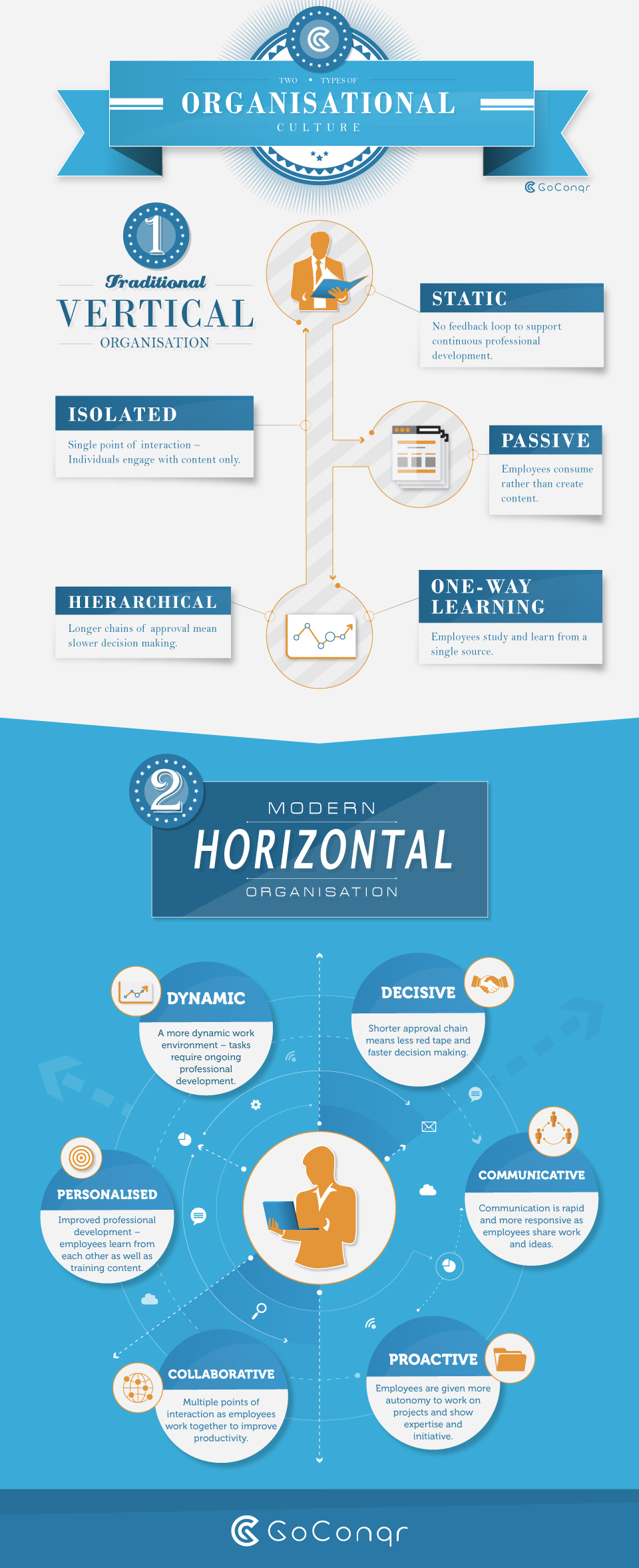Today’s workforce stands apart from those of preceding generations, and it’s not just down to skinny jeans.
There’s a discernible attitude that goes beyond popular trends and fads. Younger workers want to work for companies that will work for them. They want their jobs to be a part of their lifestyle rather than just a supplement to it. In essence, what they want is a greater degree of flexibility.

Gone are the days of looking to work for a huge company where you could spend the rest of your career. That kind of stability is now viewed by many as a cause of sterility, and top-down, vertical organisations have become old hat. Instead, Generation Y millennials are seeking to align their talents to new horizontal structures: vibrant knowledge societies more akin to the fluid dynamics of café culture than they are to rigid corporatism.
Awesome Organisational Cultures: The Facts of the Matter
If you’re asking yourself what kinds of organisational cultures offer such flexibility then you need look no further than the high-performing start-ups seemingly abundant in the tech or craft beer industries.
These organisations offer adaptability, employee autonomy and access to technology, information and training.
Such enticements are hugely effective. In a major study, PayScale and Millennial Branding interviewed more than 500,000 Americans aged between 19 and 29 and found that just 23% of them worked for companies with over 1,500 employees, while a lions’ share of 47% worked for companies that had fewer than 100 employees.
So why are large multinationals failing to attract new talent?
Mainly because their organisational culture is a bad fit for younger employees.
How can such a statement be justified? Well, consider the fact that millenials are born in a society dominated by rapid technological advance, easy and constant access to knowledge, and proliferating social networks.

Larger, long-established companies must adapt to these changes while using the same old creaking internal processes they had 20 years ago. Change on a large scale takes time, which makes transforming work culture a slow process that’s simply out of tune with the lifestyles of the average Generation Y employee.
In this context, it’s hardly surprising that the new labour force decant to work in start-ups that advocate a more flexible model designed to suit individual workstyles and encourage maximum productivity. This is where horizontal organisations have a distinct advantage over their more established peers.
So what exactly does a horizontal organisation offer? Below we outline 7 essential traits that help horizontal organisations nurture a vibrant knowledge society.
7 Characteristics of a Horizontal Organisation
1. More decisive
Few things are as frustrating as watching weeks of hard work go stagnant or ideas get lost in the ether thanks to a tedious chain of approval. With horizontal organisations, there are no weeks of waiting until projects are given the green light. They are more willing to embrace change and test out new ideas.
2. Open communication
Nothing prevents open communication in the workplace as much as convoluted procedure and static hierarchies. Ever wish you could just talk to the CEO to explain your amazing idea? For horizontal companies, it’s just a matter of stopping by his or her office or connecting online.
3. Proactive
Contributing ideas and making suggestions is encouraged at all times because smaller more dynamic companies value a “culture of doing” – that is, an active culture in which employees have the freedom to engage and collaborate across departments on various projects.
4. Focused on training and talent development
As outlined in a previous article, a massive 93% of millennials see learning and skills development as a crucial part of their careers. In fact 79% said the opportunity to learn new skills is actually a key factor in deciding where to apply for work.
The most successful horizontal organisations give employees the opportunity (and time) to develop their skillsets by undergoing training in areas of interest.
5. Collaboration is key
This “in it together” mentality encourages dynamic knowledge sharing in all directions as teams collaborate, communicate, increase empathy and improve their understanding of colleagues’ workflows and responsibilities.
6. Personalised for a better fit
Why stand on ceremony if it just makes you feel awkward and behave unnaturally? Horizontal organisations embrace employee individuality, meaning appearances are secondary concerns and working hours are more fluid. Instead of being judged on appearance or punctuality, employees are evaluated on their work and achievements.
7. Greater diversity
Yes, team members in many newer companies often come from different areas and cultures, but what diversity really means here is the value a company gives to different perspectives, insights and ideas. When an organisation welcomes and supports variety, then it is also creating a culture of collaboration, communication and innovation.
Do You Work in a Horizontal Organisation?
Is your company static or dynamic? Find out by taking the quiz below:
How Did You Do?
0% – Did you know we successfully landed on the moon?
10% -50% – Do you need to fill out an application form to go to the bathroom?
60% -70% – Happy 1999!
80% -90% – Nice – with some minor improvements you’ll get there!
100% – Congratulations! You work in a dynamic horizontal organization!
Want to improve your score and better prepare your company for the future?
See how using GoConqr’s tools can promote horizontal communication in your company as well as improving employee knowledge sharing and talent development.
